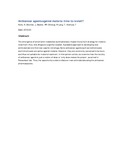| dc.contributor.author | Nzila, A | |
| dc.contributor.author | Okombo, J, | |
| dc.contributor.author | Becker, RP | |
| dc.contributor.author | Chilengi, R | |
| dc.contributor.author | Lang, T. | |
| dc.contributor.author | Niehues, T | |
| dc.date.accessioned | 2013-06-27T14:20:31Z | |
| dc.date.available | 2013-06-27T14:20:31Z | |
| dc.date.issued | 2010-03 | |
| dc.identifier.citation | Nzila A, Okombo J, Becker RP, Chilengi R, Lang T, Niehues T.;Anticancer agents against malaria: time to revisit?,Trends Parasitol. 2010 Mar;26(3):125-9. | en |
| dc.identifier.uri | http://erepository.uonbi.ac.ke:8080/xmlui/handle/123456789/41263 | |
| dc.description.abstract | The emergence of artemisinin resistance could adversely impact the current strategy for malaria treatment; thus, new drugs are urgently needed. A possible approach to developing new antimalarials is to find new uses for old drugs. Some anticancer agents such as methotrexate and trimetrexate are active against malaria. However, they are commonly perceived to be toxic and thus not suitable for malaria treatment. In this opinion article, we examine how the toxicity of anticancer agents is just a matter of dose or 'only dose makes the poison', as coined in Paracelsus' law. Thus, the opportunity exists to discover new antimalarials using the anticancer pharmacopoeia. | en |
| dc.description.uri | http://www.sciencedirect.com/science/article/pii/S1471492209002633 | |
| dc.language.iso | en | en |
| dc.publisher | University of Nairobi, | en |
| dc.title | Anticancer agents against malaria: time to revisit? | en |
| dc.type | Article | en |
| local.publisher | College of Health Sciences, | en |

